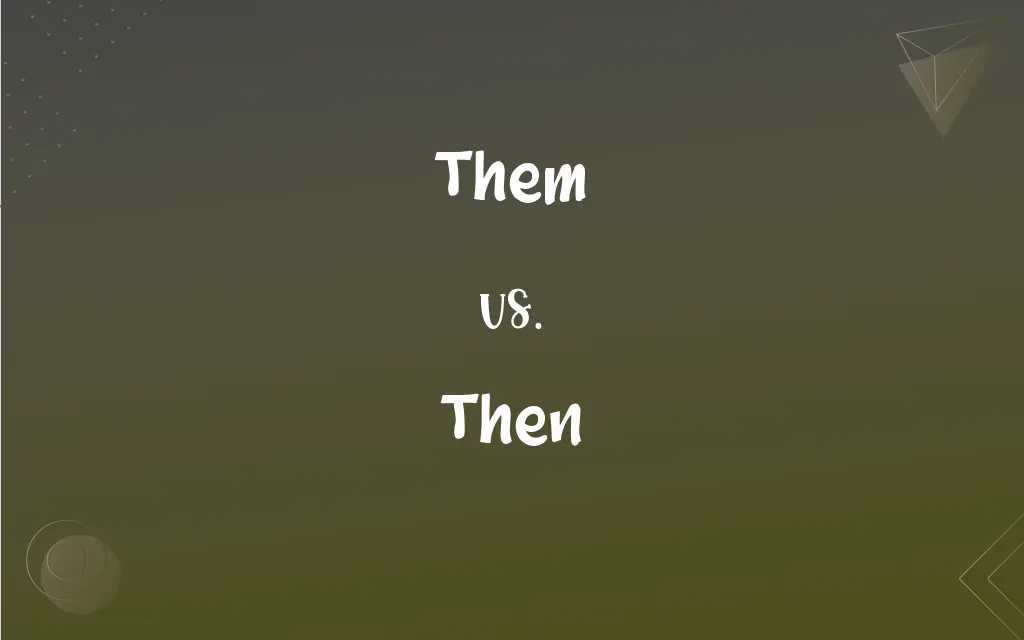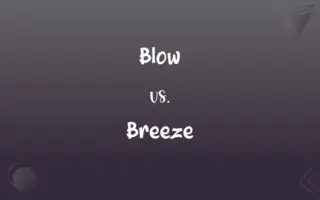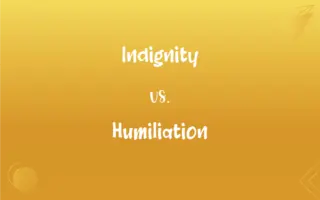Them vs. Then: What's the Difference?
Edited by Aimie Carlson || By Janet White || Updated on October 3, 2023
"Them" is a pronoun used to refer to specific people or things, while "Then" is an adverb used to refer to a specific point in time or what comes next or used to be.

Key Differences
"Them" and "Then" are English words with entirely different roles and meanings within a sentence structure. "Them" is an object pronoun used to represent certain people, animals, or things already mentioned or implied. It serves as the object of a verb or preposition, replacing plural nouns to avoid redundancy and enhance coherence in speech or writing. For instance, "We invited our friends to the party, and we are excited to see them."
On the other hand, "Then" serves as an adverb, primarily denoting time. It can refer to a specific point in time, express sequence, or imply a result or consequence. It is versatile, allowing for varied applications in different contexts. For example, "She studied for hours, and then she took the exam," here, "Then" denotes the sequence of actions.
While "Them" is concerned with representing specific entities in conversation or writing, "Then" focuses on the progression of time, sequence, or logical consequence within the narrative. It's essential to differentiate between "Them," which helps in referring back to entities, and "Then," which aids in connecting ideas, events, or actions logically and temporally.
Understanding the contrast between "Them," a pronoun, and "Then," an adverb, is crucial for coherent and meaningful communication. "Them" contributes to sentence clarity by replacing plural nouns, ensuring succinct and clear expression, while "Then" provides context and logical flow by indicating temporal or consequential relations among ideas or events.
Using "Them" and "Then" appropriately is pivotal for achieving precision and clarity in language use. While "Them" provides referential simplicity by replacing nouns, "Then" enriches expression by illustrating temporal or logical relations, thereby adding depth and coherence to communication.
ADVERTISEMENT
Comparison Chart
Part of Speech
Pronoun
Adverb
Function
Represents specific people or things mentioned
Indicates time, sequence, or consequence
Usage
Used as the object of a verb or preposition
Used to relate actions or events in time or logic
Example
"I saw them at the store."
"First, mix the ingredients, then bake for 30 minutes."
Context
Referential
Temporal, sequential, consequential
ADVERTISEMENT
Them and Then Definitions
Them
Plural object pronoun replacing specific nouns.
Please give them the books.
Then
Adverb indicating a specific point in time.
I lived in New York back then.
Them
Used to refer to certain people or things.
The kids are playing outside; I will call them for dinner.
Then
Next in time, space, or order; immediately afterward
Watched the late movie and then went to bed.
Them
Serves as the object of verbs or prepositions.
She baked cookies for them.
Then
Used to contrast a previous statement.
He said he would call, but then he didn’t.
Them
Represents groups, implying plurality.
The birds are flying high; I can’t reach them.
Then
At that time
I was still in school then. Come at noon.
I'll be ready then.
Them
Those
"Them dogs will find the end of them footprints before ten o'clock" (William Faulkner).
Then
In addition; moreover; besides
It costs $20, and then there's the sales tax to pay.
Them
(in the plural) Those ones.
Then
Used after but to qualify or balance a preceding statement
The star was nervous, but then who isn't on the first night of a new play.
Them
Used as the direct object of a verb.
She treated them for a cold.
Then
In that case; accordingly
If traffic is heavy, then allow extra time.
Them
Used as the indirect object of a verb.
She wrote them a letter.
Then
As a consequence; therefore
The case, then, is closed.
Them
Used as the object of a preposition.
Give it to them.
Then
Usage Problem And after that
I showered, then combed my hair.
Them
(in the singular) A single person, previously mentioned, especially if of unknown or non-binary gender.
Then
That time or moment
The bus leaves at four.
Until then let's walk.
Them
Used as the direct object of a verb.
If a student has an inappropriate question, whatever you do, do not berate them.
Then
Being so at that time
The then chairman of the board.
Them
Used as the indirect object of a verb.
If one of my patients calls, please bring them their dinner.
Then
(temporal location) At that time.
He was happy then.
Them
Used as the object of a preposition.
If someone comes and asks for the ticket, just give it to them.
Then
(temporal location) Soon afterward.
He fixed it, then left.
Turn left, then right, then right again, then keep going until you reach the service station.
Them
(dialectal) Those.
Then
(sequence) Next in order of place.
There are three green ones, then a blue one.
Them
The objective case of they. See They.
Go ye rather to them that sell, and buy for yourselves.
Then shall the King say unto them on his right hand, Come, ye blessed of my Father.
Little stars may hide them when they list.
Then
In addition; also; besides.
Them
Refers back to entities previously mentioned.
The students submitted their assignments; the teacher will grade them.
Then
(conjunctive) In that case.
If it’s locked, then we’ll need the key.
Is it 12 o'clock already? Then it's time for me to leave.
You don't like potatoes? What do you want me to cook, then?
Then
(sequence) At the same time; on the other hand.
That’s a nice shirt, but then, so is the other one.
Then
Used to contradict an assertion.
Then
Being so at that time.
Then
That time
It will be finished before then.
Then
Obsolete spelling of than
Then
Misspelling of than
Then
At that time (referring to a time specified, either past or future).
And the Canaanite was then in the land.
Now I know in part; but then shall I know even as also I am known.
Then
Soon afterward, or immediately; next; afterward.
First be reconciled to thy brother, and then come and offer thy gift.
Then
At another time; later; again.
One while the master is not aware of what is done, and then in other cases it may fall out to be own act.
But that opinion, I trust, by then this following argument hath been well read, will be left for one of the mysteries of an indulgent Antichrist.
Then
Than.
Then
In that case; in consequence; as a consequence; therefore; for this reason.
If all this be so, then man has a natural freedom.
Now, then, be all thy weighty cares away.
Then
That time; that moment;
We will arrive before then
We were friends from then on
Then
At a specific prior time;
The then president
Then
Subsequently or soon afterward (often used as sentence connectors);
Then he left
Go left first, then right
First came lightning, then thunder
We watched the late movie and then went to bed
And so home and to bed
Then
In that case or as a consequence;
If he didn't take it, then who did?
Keep it then if you want to
The case, then, is closed
You've made up your mind then?
Then you'll be rich
Then
At that time;
I was young then
Prices were lower back then
Science as it was then taught
Then
Refers to what comes next in sequence.
Mix the ingredients well, then add water.
Then
Implies a consequence or result.
If you study hard, then you will pass the exam.
Then
Indicates a former state or condition.
The building was an art gallery back then.
FAQs
Can "Then" be used to refer to a condition or result?
Yes, "Then" can imply a consequence or condition, e.g., "If it rains, then we will stay indoors."
Is "Them" only used to refer to people?
No, "Them" can refer to people, animals, or things.
Can "Them" replace singular nouns?
No, "Them" is plural and replaces plural nouns.
Can "Then" be used to denote contrast?
Yes, "Then" can be used to contrast different parts of a sentence.
Can "Them" be used as a subject pronoun?
No, "Them" is an object pronoun; "They" is the corresponding subject pronoun.
Is "Them" always plural?
Yes, "Them" is a plural pronoun.
Does "Then" always follow a comma?
Often, but not always. It depends on the sentence structure.
Is "Then" always related to time?
Primarily, but it can also denote sequence, contrast, or consequence.
Can "Then" start a sentence?
Yes, "Then" can be used at the beginning, middle, or end of a sentence.
Can "Them" refer to both humans and non-humans in the same sentence?
Yes, if the context makes it clear who or what "Them" refers to.
Can "Them" refer to indefinite pronouns like "anyone"?
No, "Them" refers to definite, plural antecedents.
Is "Then" used only in past tense scenarios?
No, "Then" can be used to denote time, sequence, or consequence in various tenses.
Is "Then" synonymous with "Therefore"?
They can be similar but are not always interchangeable.
Can “Them” be used for emphasis?
It can be emphasized in speech or writing, e.g., “I told THEM not to go.”
Is "Them" formal or informal language?
"Them" is standard and can be used in both formal and informal contexts.
About Author
Written by
Janet WhiteJanet White has been an esteemed writer and blogger for Difference Wiki. Holding a Master's degree in Science and Medical Journalism from the prestigious Boston University, she has consistently demonstrated her expertise and passion for her field. When she's not immersed in her work, Janet relishes her time exercising, delving into a good book, and cherishing moments with friends and family.
Edited by
Aimie CarlsonAimie Carlson, holding a master's degree in English literature, is a fervent English language enthusiast. She lends her writing talents to Difference Wiki, a prominent website that specializes in comparisons, offering readers insightful analyses that both captivate and inform.































































